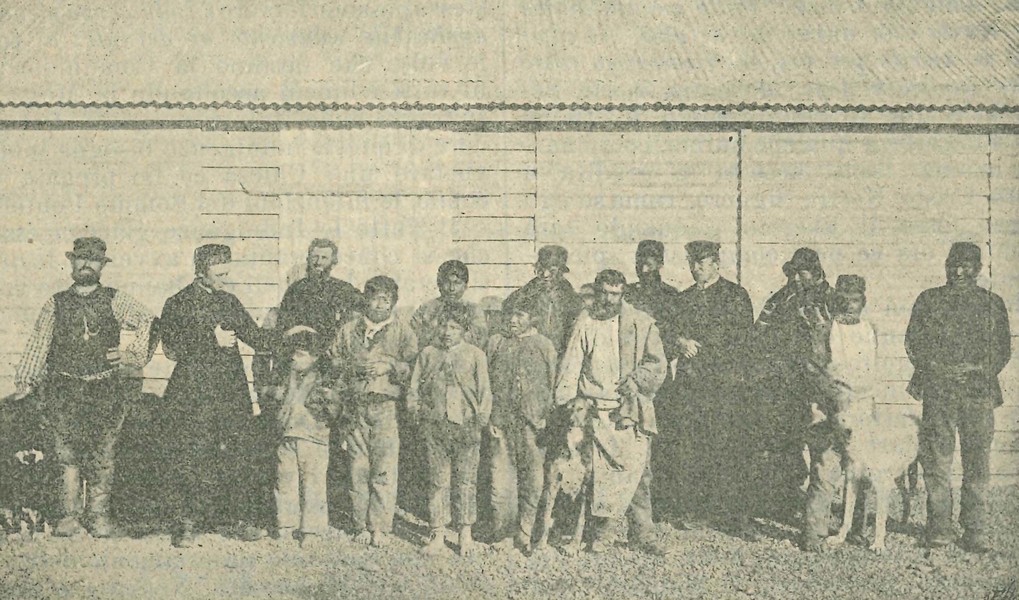Reading time: 4 min.
Here is the dream that saw Don Bosco decide to start the missionary apostolate in Patagonia.
He narrated it for the first time to Pius IX in March 1876. Later he repeated the story to some Salesians in private. The first to be admitted to this confidential narration was Fr Francesco Bodrato, on 30 July of the same year. And Fr Bodrato told Fr Giulio Barberis on that same evening in Lanzo, where he had gone to spend a few days of leisure with a group of cleric novices.
Three days later, Fr Barberis went to Turin, and being in the library in conversation with the saint, walking a bit with him, he also heard the story. Fr Giulio was careful not to tell him that he had already heard it, happy to hear it repeated from his own lips, also because Don Bosco, in telling these stories, always had some new interesting detail each time.
Fr Lemoyne also learned it from Don Bosco’s lip; and both Fr Barberis and Fr Lemoyne put it in writing. “Don Bosco,” Fr Lemoyne said, “told them that they were the first to whom he revealed this kind of vision in detail, which we recount here almost in his own words.”
I seemed to be in a wild region I had never before seen, an immense untilled plain, unbroken by hills or mountains, except at the farthest end, where I could see the outline of jagged mountains. Throngs of naked, dark-skinned, fierce-looking, long-haired men of exceptional height and build swarmed all over this plain. Their only garments were hides strung across their shoulders. Their weapons were long spears and slings.
These throngs, scattered about, presented varied sights to the spectator: some men were hunting, others were carrying bloodied chunks of meat at spear point, still others were fighting among themselves or with European soldiers. I shuddered at the sight of corpses lying all over the ground. Just then many people came into sight at the far edge of the plain. Their clothing and demeanor told me they were missionaries of various orders who had come to preach the Christian faith to these barbarians. I stared intently at them but could recognize no one. They strode directly to those savages, but the latter immediately overwhelmed them with fiendish fury and hatred, killing them, ripping them apart, hacking them into pieces, and brandishing chunks of their flesh on the barbs of their long spears. Now and then, fighting broke out again among the savages or against neighboring tribes.
After witnessing this horrible bloodshed, I said to myself: How can one convert so brutal a people? Then I saw a small band of other missionaries, led by a number of young boys, advance cheerfully toward those savages.
I feared for them, thinking, They are walking to their death. I went to meet them; they were clerics and priests. When I looked closely at them, I recognized them as our own Salesians. I personally knew only those in front, but I could see that the others too were Salesians.
How can this be? I exclaimed. I did not want them to advance any further because I feared that soon their fate would be that of the former missionaries. I was about to force them back when I saw that the barbarians seemed pleased by their arrival. Lowering their spears, they warmly welcomed them. In utter amazement I said to myself: let’s see how things will turn out! I saw that our missionaries mingled with them and taught them, and they docilely listened and learned quickly. They readily accepted the missionaries’ admonitions and put them into practice.
As I stood watching, I noticed that the missionaries were reciting the rosary as they advanced, and that the savages, closing in from all sides, made way for them and joined in the prayers.
After a while, our Salesians moved into the center of the throng and knelt. Encircling them, the barbarians also knelt, laying their weapons at the missionaries’ feet. Then a missionary intoned: Praise Mary, Ye Faithful Tongues, and, as with one voice, the song swelled in such unison and power that I awoke, partly frightened.
I had this same dream four or five years ago, and it sharply impressed me because I took it as a heavenly sign. Though I did not thoroughly grasp its specific meaning, I understood that it referred to the foreign missions, which even at that time were one of my most fervent aspirations.
I understood that it referred to the foreign missions, which even at that time were one of my most fervent aspirations.
Thus the dream dated back to about 1872. At first Don Bosco believed that it referred to the tribes of Ethiopia, later to the regions around Hong Kong. and finally to the aborigines of Australia and of the [East] Indies. It was only in 1874, when, as we shall see, he received most pressing requests to send Salesians to Argentina, that he clearly understood that the natives he had seen in his dream lived in Patagonia, an immense region then almost entirely unknown.
(BM X, 46-48)

